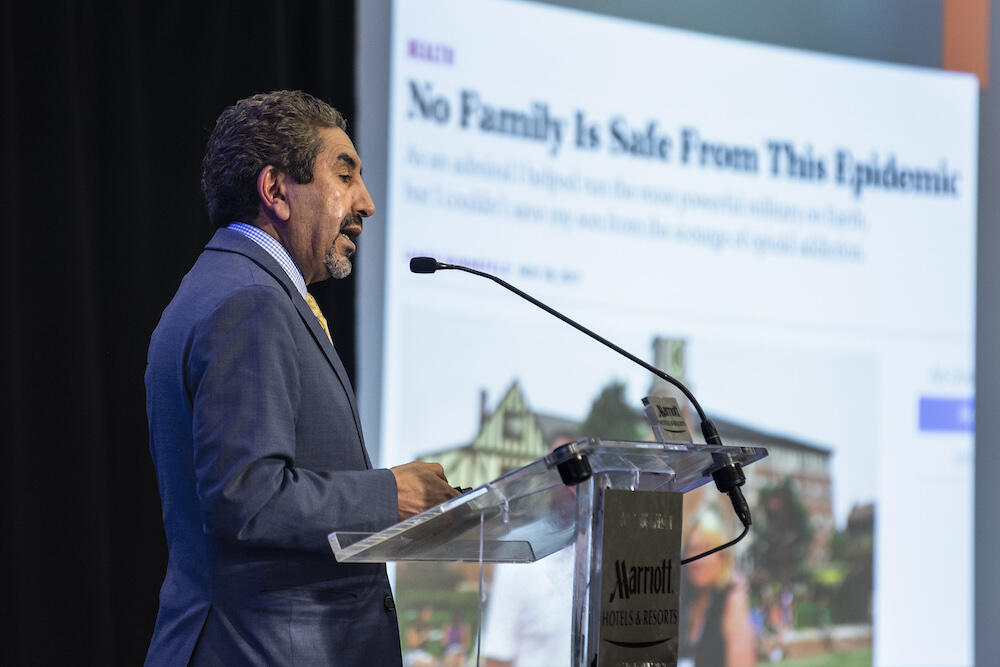April 15, 2019
VCU professor, who lost son to an opioid overdose, said lack of awareness by prescribers contributed to the opioid crisis
‘Doctors and dentists, including myself, were part of this opioid epidemic,’ Omar Abubaker said.
Share this story

The National Institutes of Health estimates that 80% of heroin users started with prescription drug medication. Prescribing practices of doctors and dentists prior to the height of the opioid epidemic are to blame for these numbers, said Omar Abubaker, D.M.D., Ph.D., chair of oral and maxillofacial surgery in the Virginia Commonwealth University School of Dentistry.
The opioid crisis was over two decades in the making, Abubaker said. In the 1990s, in an effort to relieve patient pain — often without full awareness of the addictive potential — prescribers used opioids to treat a wide variety of conditions beyond those caused by acute or terminal pain.
After the loss of his 21-year-old son, Adam, to an opioid overdose in 2014, Abubaker made it his mission to teach students in the schools of Dentistry and Medicine safe prescribing practices. As a practicing dentist, Abubaker admits to initially being part of the problem.
“There’s a narrative in this country, and I say this on behalf of all parents in this country who are affected by the opioid epidemic. Doctors and dentists, including myself, were part of this opioid epidemic,” Abubaker said. “Anybody who denies that is not telling the truth. … What is important looking forward is to do something about it.”
In high school, Adam Abubaker had surgery for a minor shoulder injury sustained during football practice. The surgeon prescribed 90 Vicodin pills after the procedure. Abubaker believes that first physician-enabled exposure to narcotics led to his son’s heroin addiction.
“He didn’t get hooked at the time,” Abubaker said. “But eventually he kept coming back.”
An estimated 20% of patients in 2016 presenting to physician offices with noncancer pain symptoms, including acute and chronic pain, received an opioid prescription, according to the Centers for Disease Control and Prevention.
In order to reach his goal of improving public knowledge of opioids, Abubaker earned a graduate certificate in international addiction studies.
“My studies confirmed my previous lack of scientific and medical knowledge about addiction,” he said. “Not surprisingly, many of my colleagues in medicine and dentistry shared these profound deficiencies.”
Abubaker uses his personal and professional experience with the opioid epidemic to lecture on the dangers of these narcotics whenever possible at schools, places of worship, dental schools, legislative and advocacy groups, local, and regional and national dental conferences. In 2017, physicians and educators from VCU’s Schools of Medicine and Dentistry collaborated on a web-based continuing medical education course that instructs practicing physicians, nurse practitioners and physician assistants on safe opioid prescribing practices.
For his efforts to combat the opioid epidemic, Abubaker received the Rao R. Ivatury Award during the annual Rao R. Ivatury Trauma Symposium in late March. The award, which recognizes leaders for their contributions to mentorship, education and service, was named for the former chief of trauma, critical care and emergency surgery at VCU Medical Center from 1988 to 2012.
Michel Aboutanos, M.D., VCU Trauma Center medical director, presented the award to Abubaker and praised him for resilience and public service.
“Dr. Abubaker has turned a personal tragedy into an educational opportunity to help all of us,” Aboutanos said. “He is dedicated to teaching and service.”
Subscribe to VCU News
Subscribe to VCU News at newsletter.vcu.edu and receive a selection of stories, videos, photos, news clips and event listings in your inbox.










